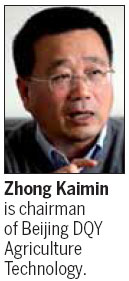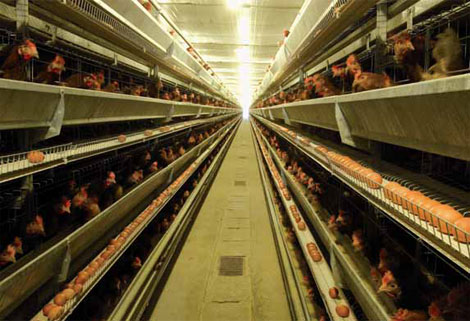Of eggs and hogs
Updated: 2012-05-18 07:51
By Zhong Nan (China Daily)
|
||||||||
|
Although the production of eggs remains DQY's focus, it is also banking on bioenergy. Provided to China Daily |
Chinese poultry company DQY teams up with Smithfield foods, an American meat supplier, for biofuel venture
They are as different as chalk and cheese and operate two lines of business that have nothing in common. But sometimes it takes two different minds to tango and make a difference in the green industry.
Chinese egg producer Beijing DQY Agriculture Technology Co Ltd has teamed up with American meat supplier Smithfield Foods Inc to set up a $1.8 billion biofuel plant company in the United States. The venture, slated to be operational by the year-end, will use waste from a Smithfield pig farm and have a power generation capacity of 1 megawatt.
More importantly the venture will also produce 3.5 million cubic meters of methane and 7 million kWh of electricity every year. It will also reduce carbon dioxide emissions by 42,000 tons.
The joint venture will be operated by the subsidiaries of the two companies - Beijing Helee Bio-Energy Ltd and Murphy-Brown. It is already undertaking the first phase of the project in North Carolina.
Under the plan, DQY will generate power by transforming the manure of more than 82,000 pigs into methane, along with a power generation capacity of 1 mW. The contract is estimated to be worth $5 million.
The North Carolina project is still a deal on paper and will need to clear tough quality regulations and environmental protection hurdles in the US. DQY is currently helping Smithfield Foods to build specially designed pipelines to reshape the way pig farms are managed in North Carolina.
"We are planning to achieve power generation capacity of 10 mW from our second-step project planned later this year with a contract value of around $50 million," says Zhong Kaimin, chairman and president of DQY.
"With Smithfield's 2,682 pig farms and more than 26 million pigs in the US alone, we are capable of generating more bio-energy power in the US over the next 10 years."
Explaining the marriage of unconventional partners, Zhong says that Smithfield chose to team up with DQY after the Chinese company proposed a new idea called the "Future Farm". DQY believes that farms in the future should be able to create ecological benefits and also feasible economic returns. At the same time, farms also need to be a socially responsible. "The DQY farm concept and business model relies largely on these concepts," he says.
"When we presented the Future Farm idea to the $12.2 billion Fortune 500 company Smithfield in 2011, they were keen to team up with us as the concepts were in line with their green development goals," Zhong says.
But where did the idea of turning waste to biogas come about for the egg producer?

In 2000, Zhong realized that waste from his chicken farms was proving to be a health hazard. By then Zhong's poultry flock had reached 10,000. "I realized then that it would be good if all this waste could be put to some use." Accordingly the company decided to invest in biofuel research, primarily to generate energy from chicken manure and urine.
But the company soon realized that it would not be easy to generate biogas from chicken manure as it contained high levels of sand, often ingested by the hens to digest feed. The sand blocked or in some cases damaged the pipelines for processing methane. "Even today, many countries still don't have the technology to transform chicken waste into methane or to generate power," he says.
DQY completed its first biofuel project based on chicken waste in 2006 and produced 14 million kWh of energy and also reduced 84,000 tons of carbon dioxide at the same time. This breakthrough helped DQY to develop an integrated business model that includes ecological egg production, clean energy, food processing and organic fertilizers.
Today, the company's total investment in bio-energy projects has reached 90 million yuan ($14.3 million, 11 million euros). It also owns a biogas power project in Beijing that generates 14.5 million kWh of electricity every year. The power, produced at a cost of 0.6 yuan per kWh, is currently being sold to North China Grid Co Ltd, a subsidiary of the State Grid Corp.
Zhong says it is important for companies to come up with green solutions as the global agricultural industry is going through a tough phase. "There is more stress on our natural resources than before along with the challenges for companies to be more environment-friendly. There are also other threats like food shortages, insufficient grain outputs and dwindling energy supplies," Zhong says.
Since last year, the US Department of Agriculture and China's Ministry of Agriculture have agreed to strengthen cooperation to address food security concerns, to ensure food safety and promote sustainable agriculture, especially in the fields of renewable energy, biotechnology, environmental protection, animal production, waste treatment and quality inspection of agricultural products.
"There is no doubt that this is the right time to develop bioenergy globally as there is considerable pressure to generate cheap natural resources to produce enough power, for both developed and developing countries, in particular the US and China," Zhong says.
Lu Bu, a researcher who specializes in agricultural resources at the Chinese Academy of Agricultural Sciences, says that a majority of the rural areas in China have abundant natural resources such as straw, vegetable roots, organic and livestock wastes. All of these can be transformed into methane with proper technical assistance, Lu says.
"Take Brazil as an example. It has at least 100 million hectares that can be used for grain and biofuel production in a green manner," Lu says. "This reflects the future trend and the impact of green agriculture will be substantial and promising."
Lu says the annual grain and livestock outputs in China are higher than many countries in the world. The nation should optimize its industrial structures of farming and husbandry to produce more bio-energy and be able to supply green power in a safe and sustainable way.
Still, eggs are the key focus for DQY as demand continues to be strong in China. Nearly 300 billion eggs were consumed in China last year. Zhong says the company is also investing in and building two egg farms this year at Dingnan in East China's Jiangxi province and Chuzhou in East China's Anhui province. Both egg farms are expected to be operational in 2013.
"The eggs produced from our new farms will be supporting the major markets in South and East China," Zhong says. "Moreover, we will be able to transform more chicken waste into methane and then generate power in three locations throughout China soon."
Currently, DQY has a major egg farm in Beijing, providing half a billion eggs to the domestic market every year. Sales from its Beijing farm alone totaled 500 million yuan in 2011.
zhongnan@chinadaily.com.cn
(China Daily 05/18/2012 page16)

 Relief reaches isolated village
Relief reaches isolated village
 Rainfall poses new threats to quake-hit region
Rainfall poses new threats to quake-hit region
 Funerals begin for Boston bombing victims
Funerals begin for Boston bombing victims
 Quake takeaway from China's Air Force
Quake takeaway from China's Air Force
 Obama celebrates young inventors at science fair
Obama celebrates young inventors at science fair
 Earth Day marked around the world
Earth Day marked around the world
 Volunteer team helping students find sense of normalcy
Volunteer team helping students find sense of normalcy
 Ethnic groups quick to join rescue efforts
Ethnic groups quick to join rescue efforts
Most Viewed
Editor's Picks

|

|

|

|

|

|
Today's Top News
Chinese fleet drives out Japan's boats from Diaoyu
Health new priority for quake zone
Inspired by Guan, more Chinese pick up golf
Russia criticizes US reports on human rights
China, ROK criticize visits to shrine
Sino-US shared interests emphasized
China 'aims to share its dream with world'
Chinese president appoints 5 new ambassadors
US Weekly

|

|







